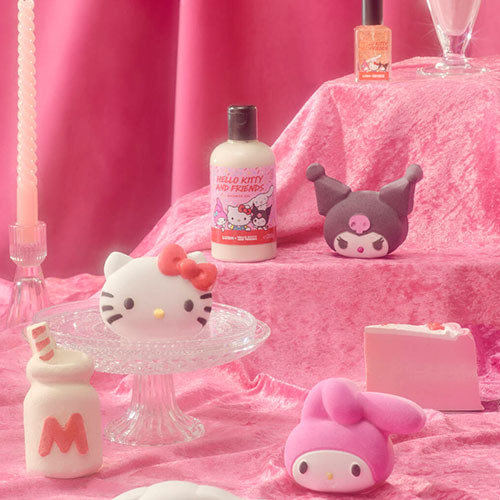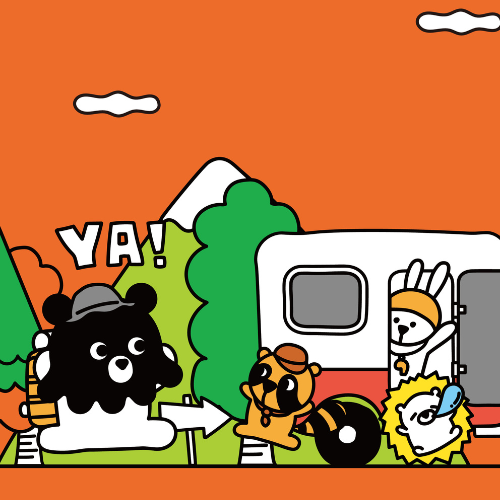Start Licensing’s Ian Downes ends another week in licensing with some examples of how fashion and talent brands are being used by retailers and licensees to add further spice to products.
One of the award categories at the recent B&LLAs was for Best Licensed Fashion or Talent brand.
Having an award for this category is a real recognition that the category is a noteworthy one in licensing and it seems to be becoming evermore significant. There could be lots of reasons for this including the rise in social media usage and of course licensing success stories. Licensees and retailers are bound to track sales success: if the category is performing well it will encourage them to consider new opportunities to tap into the power of the personality.
Maybe because of this award at the B&LLAs my radar was well tuned into some ‘in market’ examples of this kind of licensing this week.
It is not unusual to see brand personalities being used by food companies to develop products and ranges. Often these develop into long-term brands. Good examples of this are ranges featuring Ainsley Harriott and Loyd Grossman. These ranges are now firmly established at retail. Jamie Oliver is also a very visible personality brand in the food aisles.
Another success story is Levi Roots. Levi first came to prominence through the Dragon’s Den programme. Dragon Peter Jones invested in Levi’s Reggae Reggae Sauce brand (I think Richard Farleigh, another Dragon, also did). The original range was entered on the core product Reggae Reggae Sauce. I seem to recall Sainsbury’s was the launch retailer. This was back in 2007. Some 15 years later the Reggae Reggae and Levi Roots brands are well established. There have been licensed products such as carbonated drinks and crisps.
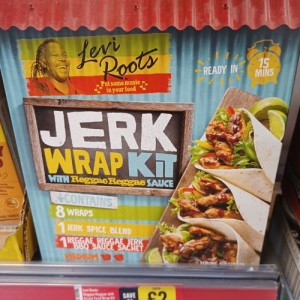 This week I spotted a new Levi roots product in Iceland. It is a Jerk Wrap Kit containing eight wraps, Jerk Spice blend and a sachet of Reggae Reggae Sauce. The Levi Roots Reggae Reggae sauce brand and product is well established, recognised and trusted.
This week I spotted a new Levi roots product in Iceland. It is a Jerk Wrap Kit containing eight wraps, Jerk Spice blend and a sachet of Reggae Reggae Sauce. The Levi Roots Reggae Reggae sauce brand and product is well established, recognised and trusted.
A key to success in the personality licensing category is being authentic and Levi Roots has managed to build a successful brand while retaining his authenticity. I would imagine this is a big part of his commercial appeal.
To see the contrasting ways that personalities are used in licensing I only had to look in a shop window a few doors down from the Iceland where I spotted Levi Roots.
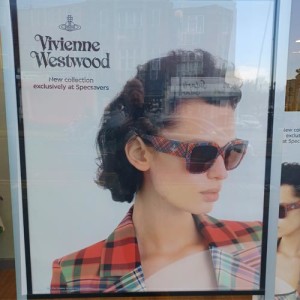 Specsavers is a retailer that is no strangers to licensing. It is currently promoting a range of Vivienne Westwood spectacle glasses and sunglasses. The exclusive range takes inspiration from the designer’s use of tartan and feature the distinctive Vivienne Westwood orb brand device. The range was promoted in the shop window with a very stylish shot of one of the products featured in a lifestyle shot. Looking online the range looks very individual, distinctive and stylish.
Specsavers is a retailer that is no strangers to licensing. It is currently promoting a range of Vivienne Westwood spectacle glasses and sunglasses. The exclusive range takes inspiration from the designer’s use of tartan and feature the distinctive Vivienne Westwood orb brand device. The range was promoted in the shop window with a very stylish shot of one of the products featured in a lifestyle shot. Looking online the range looks very individual, distinctive and stylish.
Working with Vivienne Westwood, Specsavers has been able to add some originality and flair to its products. From a consumer point of view, having access to a range designed by such a well known and charismatic designer will I am sure appeal, not least building confidence in the product choice. The glasses and sunglasses are definitely statement pieces and add glamour to a relatively conservative category. This looks like a licensing hit to me and of course the fact that it is an ‘exclusive’ range adds commercial weight to it.
Another way that brand personalities are active in licensing is through design collaborations. Of course, this is quite common in the apparel category but it is not confined to that category. Brands seem to be increasingly seeking out partnerships to add a point of difference and create momentum for social media campaigns. I think there is also an element of getting people back into physical shops: collaborations can help create retail theatre and collateral.
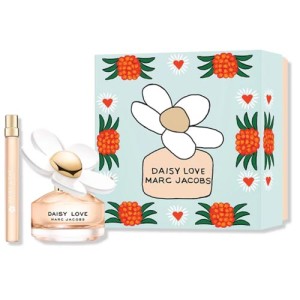 With this sort of partnership in mind it was great to see that one of our clients, US-based artist and illustrator Kendra Dandy is working with the Marc Jacobs Daisy perfume brand. Kendra’s design brand Bouffants and Broken Hearts is a licensing success story with partnerships in the UK with the likes of Boots, Cooneen and UK Greetings coupled with a long history of global success with brands such as VANS and Anthropologie.
With this sort of partnership in mind it was great to see that one of our clients, US-based artist and illustrator Kendra Dandy is working with the Marc Jacobs Daisy perfume brand. Kendra’s design brand Bouffants and Broken Hearts is a licensing success story with partnerships in the UK with the likes of Boots, Cooneen and UK Greetings coupled with a long history of global success with brands such as VANS and Anthropologie.
Kendra is frequently asked to work with brands to create bespoke visuals to be used in combination with the brand with an eye on special or limited editions. Working with Marc Jacobs Daisy, Kendra has created in-store designs for retailers such as Macy’s and bespoke design for gift set packaging. Rather like the Vivienne Westwood example, Kendra’s designs have added some freshness to the Marc Jacobs offer and in a retail context she has helped hem create eye-catching designs in a busy fixture.
This sort of design partnership is a great example of how designers with distinct design and art brands can carve out success in licensing, but also how brands recognise that designers can help give them a cutting edge. This is particularly true for brands seeking to engage with consumers in a competitive category.
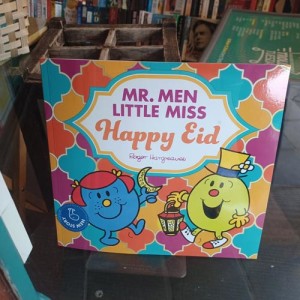 I was also pleased to see that publisher Farshore and brand owner Sanrio have developed a Mr Men & Little Miss book ‘Happy Eid’. I saw it displayed in my local book shop and thought that it was a really good example of a brand owner and licensee responding to the changing shape of society and seeking to be inclusive in their approach to publishing. It is also a smart move commercially and I am sure will open up other opportunities for them.
I was also pleased to see that publisher Farshore and brand owner Sanrio have developed a Mr Men & Little Miss book ‘Happy Eid’. I saw it displayed in my local book shop and thought that it was a really good example of a brand owner and licensee responding to the changing shape of society and seeking to be inclusive in their approach to publishing. It is also a smart move commercially and I am sure will open up other opportunities for them.
In many ways licensed characters were the original influencers and it is heartening to see a long established brand like the Mr Men & Little Miss being featured in a ‘Happy Eid’ book. Characters can be a force for good and used in proactive ways.
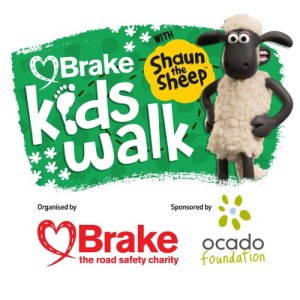 A good example of this in my own world is that Shaun the Sheep is being used by road safety charity BRAKE to theme the Brake Kids Walk.
A good example of this in my own world is that Shaun the Sheep is being used by road safety charity BRAKE to theme the Brake Kids Walk.
Scheduled for 22 June, school children will take part in a short, supervised walk to school. The idea behind the walk is to raise awareness of road safety issues and to help create a safe environment for children to walk to school. Shaun the Sheep is being used to help promote the campaign and is featured in free materials that schools can use to help explain the campaign to children. This is part of an ongoing partnership and, of course, there are other examples of well known characters being used as influencers to help cause related campaigns.
It is good to see characters being used as positive influencers.
Ian Downes runs Start Licensing, an independent brand licensing agency. His Twitter handle is @startlicensing – he would welcome your suggestions for what to look out for.
























